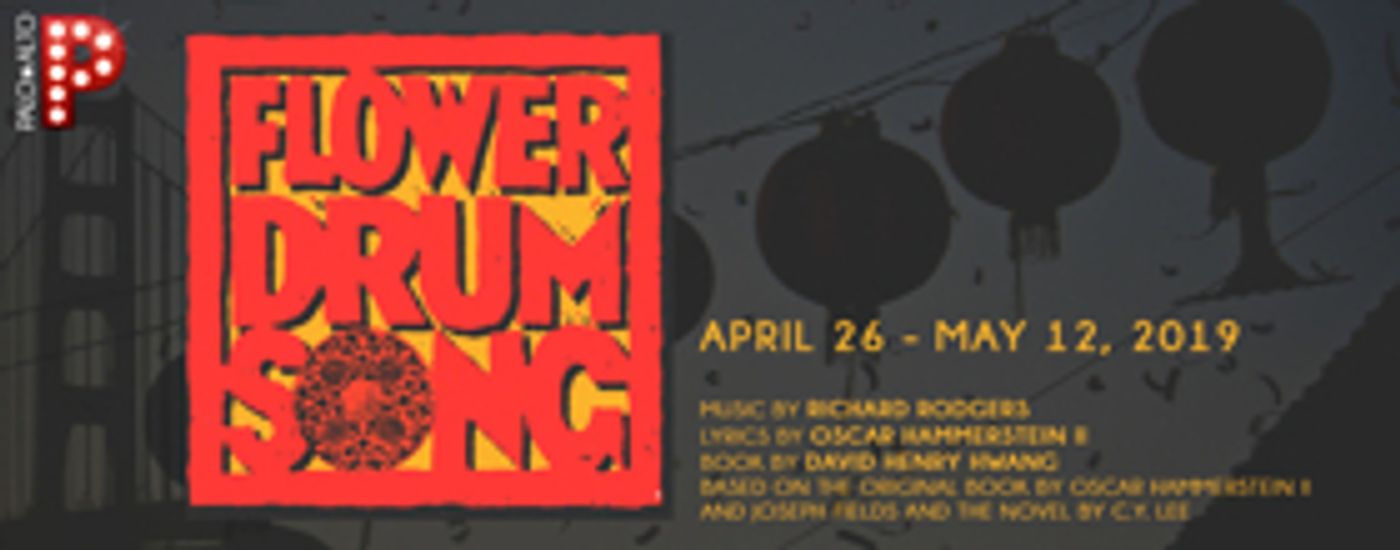Review: FLOWER DRUM SONG at Palo Alto Players Provides a Moving & Entertaining Portrait of the Asian Diaspora

Palo Alto Players presented a wonderfully stirring and delightfully entertaining production of Rodgers & Hammerstein's "Flower Drum Song." This musical tale of the Asian diaspora in 1950's San Francisco is hardly foolproof and has a bit of a checkered history. The original 1958 Broadway production was a hit running for a respectable 602 performances, but it's never been considered top-drawer Rodgers & Hammerstein and was soon overshadowed by the cultural phenom of "The Sound of Music" less than a year later. Even positive reviews over the years have tended to offer faint praise such as "pleasant" and "fine", noting that the score contains more than its share of generic tunes, the characters can too easily veer into ethnic caricature, the central female role disappears for much of the second act, and the whole enterprise can have a whiff of cultural appropriation. In 2002, the Tony-winning Chinese American playwright David Henry Hwang, who had always found the show to be a bit of a guilty pleasure, wrote a new book in hopes of helping the show resonate with 21st-century audiences.
Given the current political discourse around immigration, it turns out that the play couldn't be more timely in 2019. The Palo Alto Players production worked beautifully and made a very persuasive case for the ongoing relevance of the show. It's also the kind of show that likely benefits from a community theater production where the sheer joy of performing overrides slickness. And the enduring impact of Oscar Hammerstein's humanity should never be under-estimated. The specifics of his words may date, but the underlying themes never do. If anything, they seem to grow richer over time.
"Flower Drum Song" is a story of Chinese immigrants in 1950's San Francisco struggling to connect with each other and navigate their way through an American culture that simultaneously provides economic opportunities and confines them to stereotypes. In the opening sequence, young Mei-Li leaves China by boat after her political dissident father has been imprisoned and killed. She arrives in San Francisco to seek out Wang, a friend of her father's who runs a moribund Chinese opera company in Chinatown. Wang's son Ta has become thoroughly Americanized and is trying to turn his dad's business into the kind of "oriental" nightclub that was all the rage in mid-20th century Chinatown. Ta is also infatuated with vivacious nightclub entertainer Linda Low. From there, various couples uncouple & re-couple, children argue with their parents over how make a life in America, and all eventually find a place to belong. Along the way, there are dazzlingly campy nightclub numbers, soaring ballads, and much humor exploring the points of disconnect between cultures, generations and genders.
Director Lily Tung Crystal brings a sure touch to the material and shows an understanding that the key to performing a classic American musical is never to condescend to the material and to ground the performances in recognizable human behavior. She is equally adept at staging the eerie, understated opening with immigrants arriving via boat as she is at the satirical nightclub numbers that manage to both delight in the silliness, and question the appropriateness, of Chinese-American tropes. The direction is also filled with sly blink-and-you'll-miss-them touches such as a brief, Act 2 restaurant scene where a trio of servers each wordlessly and humorously evince their own distinct attitude to their menial jobs.
Y. Sharon Peng's fanciful costumes, Ting-Na Wang's fluid scenery, Pamila Gray's atmospheric lighting and Alex Hsu's jaunty choreography all work beautifully in synch to create a bevy of memorable sequences, such as the Act II opener "Chop Suey." This potentially questionable novelty song is transformed into a loopily entertaining commentary on faux-Chinese culture designed to appeal to white American fascination with "oriental" exoticism. Choreography for over-sized chopsticks and chorus girls dressed as Chinese takeout containers complete with fortune cookie hats hit the sweet spot between entertainment euphoria and wry observation.
The performances are top-notch across the board. Standouts include Emily Song as Mei-Li, who has a lovely groundedness, understated comic timing and a clear, effortless soprano. Marah Sotelo as Linda Low has the show's best-known number "I Enjoy Being a Girl" and knocks it out of the park. It's a perfect melding of actor and character to portray a woman who knows exactly who she is in this world and delights in her strengths. Bryan Pangilinan as the tradition-bound Wang and Melinda Meeng as ambitious theatrical agent Madame Liang represent a previous generation of immigrants and develop an unlikely and charming relationship of their own.
Ultimately, though, there is just something so inspiring about seeing a stage full of Asian and Asian-American performers having agency in telling this story and putting their hearts and souls into the performance. In Hwang's revised book, the show ends with each actor stepping forward to state the place of their birth. The array of cities and countries cited was ineffably moving, with actors from all over eastern Asia and much of the American West. It was telling that perhaps the oldest member of the cast was the only native San Franciscan. We were left with an incredibly moving reflection of our local community as its best - people from different backgrounds, cultures and generations finding common ground. This is what community theater is all about.
The Palo Alto Players production of "Flower Drum Song" ran from April 26 to May 12, 2019. Further info can be found at www.paplayers.org.
Reader Reviews
Videos

